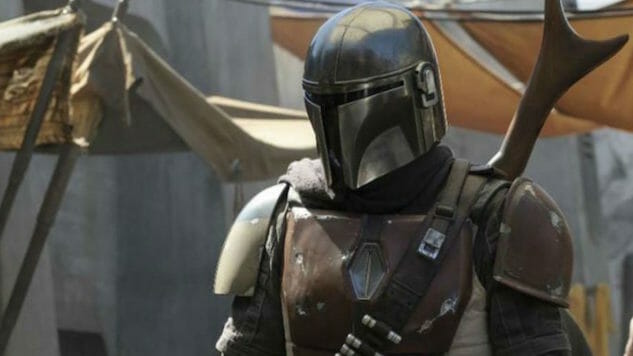Is The Mandalorian Even Interested in Being Television?
Star Wars movies are like TV shows and the TV shows want to be movies.
Photo Courtesy of Disney+
[Spoiler Note: General plot points through The Mandalorian Season 3, Episode 3 are discussed below.]
Raymond Chandler famously said a prime solution for being cornered by your own bad writing is to have someone enter the room holding a gun. Three episodes into the third season, The Mandalorian has done this so many times that the show is now one big room exclusively filled with men with guns.
Pirates, underground critters, a malfunctioning droid, TIE Fighters, a big sea monster, a very deep pool—so often the ground beneath our feet falls away as we’re plunged into unmotivated and meaningless action that, although delivered with pizazz, is nothing more than the illusion of dramatic content. No overarching conflict is worsened, no larger stakes are raised, no goals are more fiercely sought after. It’s just a man wearing a hat walking around without much urgency, free to do whatever he wants, occasionally pointing to his cute puppet son and leaving a pause so we can go, “Aww.” This costs over $15 million per episode.
Arguing that The Mandalorian is plagued with structural issues is like beating a dead tauntaun, but with two worse Disney+ series under their belt since we last saw our helmeted hero (not you, Andor), Star Wars TV is slipping out of our good graces. Apart from the thunderingly poor decision to retcon a dramatic S2 finale in somebody else’s show, we’re left with micro-goals that serve no purpose, decisions that are immediately invalidated, and no challenge to our characters’ values. What exactly is the point of all this?
So far this season: Mando turns up in Nevarro looking to reprogram the assassin droid, is told he needs to go get another part, makes a flying visit to Bo-Katan’s fortress in the Mandalore system, flies to Tatooine to gets the droid part, gets sold an astromech droid instead (if he didn’t need the assassin droid why wasn’t this addressed on Nevarro?), flies back to the Mandalore system (you were just there!!), flops about underground with some nasty critters, gets rescued, gets baptised, gets rescued again, and is accepted back into his clan with little resistance. By the end of three episodes, about 40% through the season, we have achieved the goal laid out in the premiere with little to no resistance. And I have zero clue why we took this path, nor how Mando feels about it.
What is the point of The Mandalorian? Is it that audience excitement outweighs any impulse to tell a genuinely compelling story in the Star Wars universe, and so—despite a lack of any narrative propulsement—the show must simply exist. These non-adventures are willed into existence with a collective shrug, filled with enough cowboy antics to make us think something is actually happening, that the train tracks aren’t being laid down in front of the moving train. We watch The Mandalorian for the same reason they make The Mandalorian, because “this is the way.”
Is The Mandalorian even interested in being television? It doesn’t have decent structure or pacing, nor does it take advantage of the character-building opportunities offered by the medium. Instead, we have to be content with a stuttering journey that commits a whole episode to meaningless actions and arcs that skip over huge changes. Is TV just an optic to Disney, an area that it’s profitable to expand in, meaning their flagship Star Wars property will just keep going until forced to stop?
-

-

-

-

-

-

-

-

-

-

-

-

-

-

-

-

-

-

-

-

-

-

-

-

-

-

-

-

-

-

-

-

-

-

-

-

-

-

-

-








































